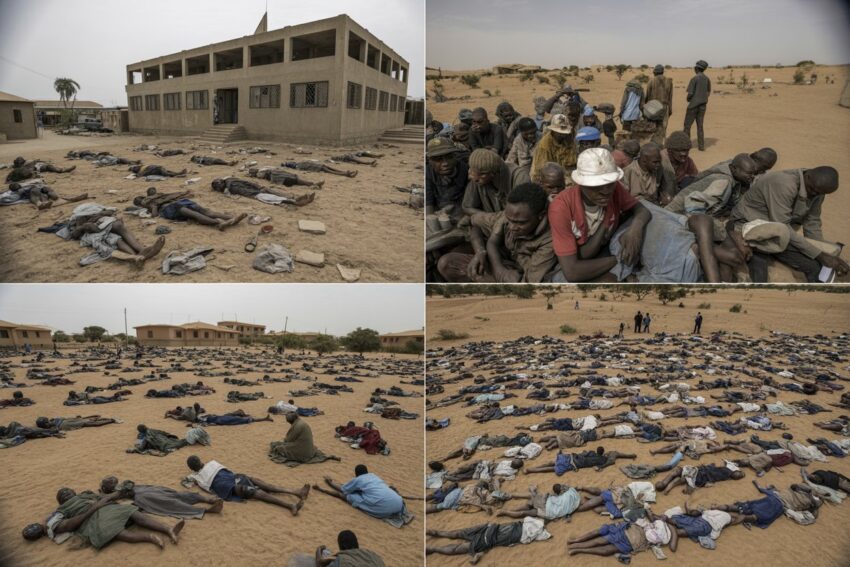RSF Massacre at El Fasher Hospital: Over 460 Dead as Atrocities Escalate

In an alarming development, the Rapid Support Forces (RSF) have reportedly killed over 460 people inside a hospital in El Fasher, the capital of North Darfur, Sudan. This massacre is the latest in a series of escalating atrocities committed by the RSF, an armed group embroiled in a brutal conflict with the Sudanese Armed Forces (SAF) since April 2023. The attack, which occurred on Sunday, marks a new low in the ongoing humanitarian disaster unfolding in Sudan.
The Attack on El Fasher Hospital
The attack occurred at the Saudi Maternity Hospital in El Fasher, where the RSF forces reportedly killed hundreds of patients, medical staff, and civilians seeking refuge. According to reports from the World Health Organization (WHO) and the Sudan Doctors Network, the RSF stormed the hospital, resulting in the brutal deaths of at least 460 people. This assault follows a pattern of violence by the RSF in Darfur, which has seen civilian deaths, widespread displacement, and severe disruptions to healthcare and humanitarian services.
Tedros Adhanom Ghebreyesus, the WHO Secretary-General, expressed his deep shock and horror at the massacre, but refrained from pointing fingers directly at any group. Nonetheless, the Sudan Doctors Network has unequivocally condemned the violence, describing the killings as “cold-blooded” and a direct violation of human rights.
The Wider Impact of RSF Atrocities in Darfur
The massacre in El Fasher is part of a broader wave of violence that has plagued Darfur since the RSF’s forces began their attacks in 2024. Over 2,000 civilians have reportedly been killed since the RSF took control of the region, including executions, looting, assaults, and shootings. Satellite images analyzed by humanitarian groups show clear evidence of mass graves and executions, further supporting claims of systematic violence.
The UN and several humanitarian organizations have described the region as being in the grips of a catastrophic crisis, with civilians suffering the brunt of the violence. Entire villages have been razed, and tens of thousands of people have been forced to flee, leaving them vulnerable to disease, starvation, and violence from armed groups. The international community has largely failed to intervene effectively, and the situation continues to spiral out of control.
International Response and the Need for Accountability
The attack on the El Fasher hospital has prompted widespread international outrage. The United States, in early 2025, formally recognized the actions of the RSF as genocide, a sentiment echoed by numerous human rights organizations and UN agencies. However, despite this recognition, tangible action against the RSF has been limited.
The RSF’s leader, Gen. Mohamed Hamdan Dagalo (Hemedti), who also serves as the deputy head of Sudan’s ruling sovereign council, has publicly acknowledged abuses by his forces but stopped short of taking responsibility for the crimes. This lack of accountability has fueled further concerns about the future of Sudan and the fate of its people. Calls for international intervention have been met with little success, and many are questioning whether the international community will ever hold the RSF accountable for its crimes.
The Growing Humanitarian Disaster
The humanitarian situation in Darfur continues to deteriorate rapidly. The RSF’s control of key towns in Darfur, including El Fasher, means they hold the region’s critical infrastructure, including hospitals, food supplies, and water sources, further exacerbating the suffering of civilians. Thousands of displaced people are in desperate need of aid, but access is severely restricted due to ongoing violence and roadblocks erected by RSF forces.
The conflict has led to severe shortages of medical supplies, with hospitals across Darfur unable to treat the wounded or deliver basic healthcare. The closure of healthcare facilities, along with the targeting of medical professionals, has led to widespread fear within the medical community. In some areas, doctors have been killed or forced to flee, while hospitals have been looted and destroyed.
The Path Forward for Sudan
The massacre at El Fasher hospital marks a turning point in the Sudanese conflict, raising fears that the violence could escalate into full-scale genocide. The international community must take immediate and meaningful action to address the ongoing atrocities. In addition to humanitarian aid, there is an urgent need for international pressure to ensure accountability for the RSF’s actions and to push for an end to the violence.
A concerted international effort is needed to protect Sudanese civilians, bring justice to those responsible for the atrocities, and begin the long process of rebuilding a war-torn nation. Without this intervention, the cycle of violence and suffering in Darfur, and throughout Sudan, will likely continue.
Conclusion
The massacre at El Fasher hospital is a chilling reminder of the depths of violence that have consumed Sudan’s Darfur region. With the RSF now controlling the majority of the region, the situation is dire, and the international community’s response has been insufficient to prevent further escalation. The people of Sudan, particularly those in Darfur, continue to endure unimaginable hardship as the RSF’s violence grows unchecked. The international community must act swiftly to end the atrocities, protect the innocent, and hold those responsible accountable for the crimes committed. Without intervention, the situation will only worsen, and Sudan’s future remains uncertain.
The post RSF Massacre at El Fasher Hospital: Over 460 Dead as Atrocities Escalate appeared first on Travel And Tour World.



